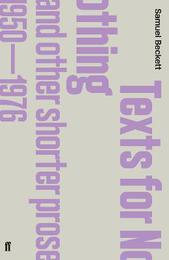
|
Texts for Nothing and Other Shorter Prose, 1950-1976
Paperback / softback
Main Details
| Title |
Texts for Nothing and Other Shorter Prose, 1950-1976
|
| Authors and Contributors |
By (author) Samuel Beckett
|
| Physical Properties |
| Format:Paperback / softback | | Pages:224 | | Dimensions(mm): Height 198,Width 130 |
|
| Category/Genre | Religious and spiritual fiction |
|---|
| ISBN/Barcode |
9780571244621
|
| Classifications | Dewey:843.912 |
|---|
| Audience | |
|---|
| Edition |
Main
|
|
Publishing Details |
| Publisher |
Faber & Faber
|
| Imprint |
Faber & Faber
|
| Publication Date |
3 June 2010 |
| Publication Country |
United Kingdom
|
Description
This is the last of three volumes of collected shorter prose to be published in the Faber edition of the works of Samuel Beckett - which already includes a volume of early stories (The Expelled / The Calmative / The End / First Love) and of late stories (Company / Ill Seen Ill Said / Worstward Ho / Stirrings Still). The present volume contains all of the short fictions - some of them no longer than a page - written and published by Beckett between 1950 and the early 1970s. Most were written in French, and they mostly belong within three loose sequences: Texts for Nothing, Fizzles and Residua. The edition also includes two remarkable independent narratives: From an Abandoned Work and As The Story Was Told. All of these texts whose unsleeping subject is themselves, demonstrate that the short story is one of the recurrent modes of Beckett's imagination, and occasions some of his greatest works.
Author Biography
Samuel Beckett was born in Dublin in 1906. He was educated at Portora Royal School and Trinity College, Dublin, where he graduated in 1927. His made his poetry debut in 1930 with Whoroscope and followed it with essays and two novels before World War II. He wrote one of his most famous plays, Waiting for Godot, in 1949 but it wasn't published in English until 1954. Waiting for Godot brought Beckett international fame and firmly established him as a leading figure in the Theatre of the Absurd. He received the Nobel Prize for Literature in 1961. Beckett continued to write prolifically for radio, TV and the theatre until his death in 1989.
|